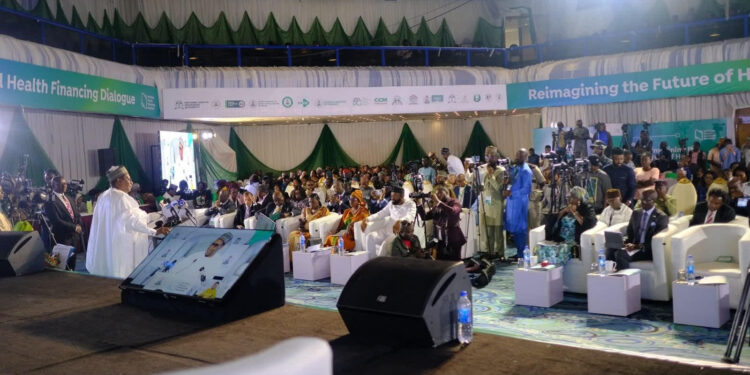Stakeholders came together in Abuja recently to address how Nigeria will finance its health system sustainably, equitably, efficiently and effectively.
With the theme “Turning Health Commitments into Tangible Impact through Government Action and Partner Collaboration,” the Health Minister described the event as an “important milestone in our shared journey toward universal health coverage, as we convened the National Dialogue on Health Financing in Nigeria.”
This was disclosed by the media team of the Coordinating Minister of Health and Social Welfare, Prof. Muhammad Ali Pate.
Pate revealed that the leadership of His Excellency, President Bola Ahmed Tinubu, GCFR, has continued to drive the growth and current development in the sector.
He maintained that the recent Presidential directive on mandatory health insurance marked a decisive shift from aspiration to enforcement. “By this mandate we are creating a virtuous cycle in which financially protected employees are healthier, more productive, and better able to drive economic growth. Our goal is to reach 44 million Nigerians with health insurance by 2030—the largest insured pool on the continent,” he stated.
The dialogue, it was gathered, reviewed concrete progress including expansion of the vulnerable groups fund; free emergency obstetric services; thousands of fistula repairs; subsidies for dialysis; establishment of the Catastrophic Health Insurance Fund in the 2025 budget; and strengthened partnerships in local pharmaceutical and medical manufacturing, among several others. “These reforms are already saving lives, protecting households, and strengthening resilience.
“We also addressed persistent gaps: high out-of-pocket spending, uneven insurance coverage, delayed counterpart funding, and accountability and data weaknesses. Lessons from global experience confirmed that rapid progress towards universal health coverage requires increasing the public share of financing through economic growth, rising revenues, and deliberate prioritisation of health.
“Nigeria is on this path, with fiscal reforms reducing the national deficit from 5.4 percent of Gross Domestic Products (GDP) to 3 percent, raising revenues to 11.5 percent of GDP, and generating surpluses across 34 states. This fiscal space must be applied to health as human infrastructure and a pillar of national security,” he explained.
In addition, he said, the next steps include briefing the National Economic Council on: state domestication of health laws to secure the Basic Health Care Provision Fund (BHCPF); deducting counterpart contributions at source to ensure release; periodic FAAC savings allocations for health, school feeding, and social protection; and support for the National Assembly bill to raise the BHCPF above one percent of the CRF. “Such measures would provide reliable financing for vaccines, essential commodities, and expanded protection for vulnerable groups.
“The Dialogue reaffirmed the role of the private sector and innovation. Impact investing, tax incentives, and public-private partnerships can expand investment in infrastructure, manufacturing, and service delivery. Health taxes on tobacco, alcohol, and sugar-sweetened beverages may offer the double benefit of reducing harmful consumption and creating additional fiscal space.
“NHIA will also continue market-shaping measures to lower costs through pooled procurement and to strengthen local manufacturers.
“Accountability and data will remain central. Quarterly performance dialogues with states, the Joint Annual Review @SWApGov, the Council on Health, and the mini-DHS will guide course corrections and strengthen results.
“…We also recognize the contributions of development partners and call for continued use of national systems and respect for national priorities.
“The Nigerian diaspora has an important role, with initiatives such as the Diaspora Health Hub of the African Development Corporation creating structured platforms for sustainable support. Care365 Health Hub recently launched is another example.
“This maiden Dialogue has shown that we can mobilise domestic resources, strengthen institutions, and contribute solutions within the African and evolving global financing landscape. The message is clear: health financing is not only about sustaining a health system but about protecting economic security, social stability, and the dignity of every Nigerian.
“We continue to appreciate all our global health partners, Gavi, the Vaccine Alliance, Global Fund, bilateral and multilateral funders, philanthropies, for their contributions and partnerships.
“We will seize the moment to reset our approaches in line with lessons learned while moderating expectations that our path to exiting dependency will take time, toil, and sacrifices.”
Participants comprised: the Federal Government Ministers including Coordinating Minister of the Economy and Minister of Finance, Chief Wale Edun and Hon Minister of Budget and Economic Planning, H.E. Sen. Atiku Bagudu; Chairman of the Joint National Assembly Committee, Senator Dr. Harry I. Banigo, State Governors, especially, the Governor of Anambra State, H. E. Prof Charles Soludo; Governors Forum, Heads of Federal State Agencies and Parastatals, Commissioners of Health, development partners, private sector leaders, academia, civil society, National Health Fellows, and community voices.
























